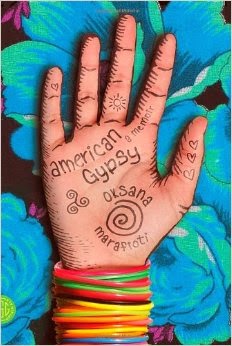
I found a box of books I had labeled "Classics" which contained books I had read from middle school, through high school and college, maybe a bit after that. I was amazed at what I found there, and maybe that deserves a post in and of itself, I decided to keep some, reread a few of the books. I remember hearing about D.H. Lawrence, so of course I read Lady Chatterly's Lover, but I had also picked up this book. Since I just recently finished the American Gypsy and want to delve a bit more into the world of gypsies, I decide to reread this short book that was published posthumously. The cover is from the yellowed paperback copy I own.
I am amazed that I used to read these types of books that I now consider moving very slowly. It is about a young woman Yvette in the 1920's England, who comes home to the rectory from her schooling with her sister. Her mother left the family years ago and her father, aunt and grandmother try to do everything to make sure the girls don't turn out like their mother. Yvette is bored, goes out with friends, sews dresses, befriends an unmarried couple, and is fascinated by a gypsy man she sees in the gypsy encampment outside her town. He notices her too. The story seems to move excruciatingly slowly and then ends with a roller-coaster ride, so worth it in the end. I need to remember that it was a book ahead of its time - "The last and most provocative novel from the genius of D.H. Lawrence" as is written on the book cover.
As often is the case when I read books, it is the side things that fascinate me. Again, I don't get the inactivity of Yvette and women of her class. She seems to be waiting around to get married - as the only option for a future, and the pickings are slim. She hates her life, the food, living with granny, a sour aunt, and a disillusioned father. Her sister at least has a job, that gets her our of the house, provides her with her own pocket money. If she hates the food, how about learning to cook and make it tastier? Find a hobby, a charity, anything. I keep thinking there is so much to do out in the world, I keep wishing I could clone myself to do all the things I would like to do.
Then there were the gypsies, which is one of the main reasons I picked up the book. I am sure this depicts the way gypsies lived in England and in many other places in Europe, including Latvia. They would travel in a caravan, find a place to settle down for the winter, make and sell things, read people's fortunes. They looked and dressed exotically, had a certain pride and fierce independence, but knew to be deferent when needed. I am sure some could have the sensuality that Yvette noticed. I still need to read more about them.

